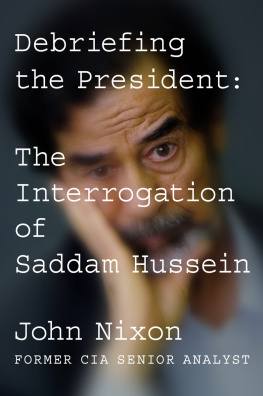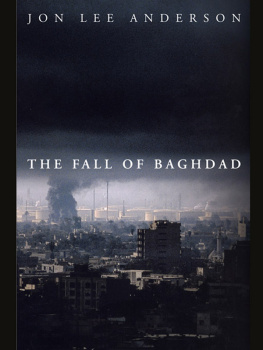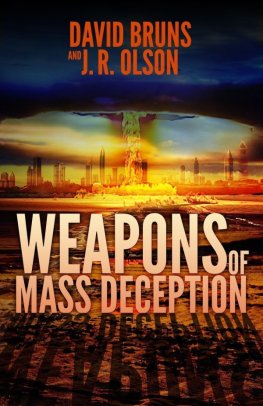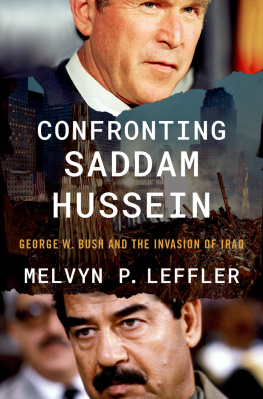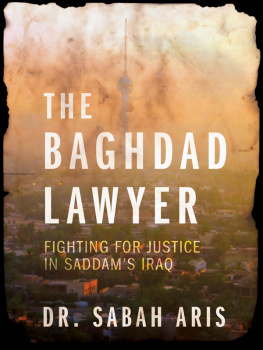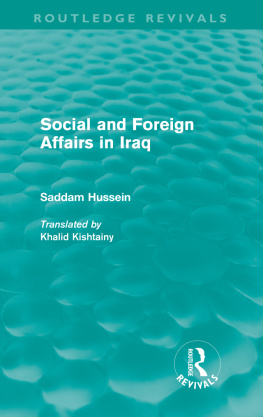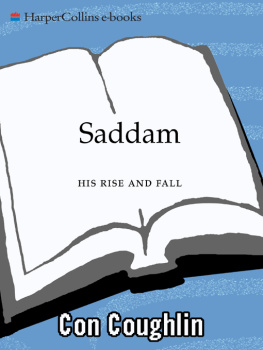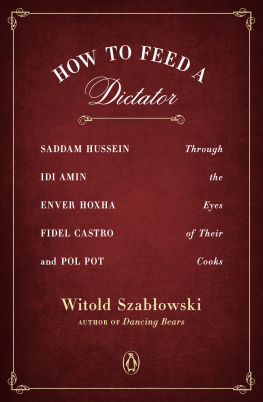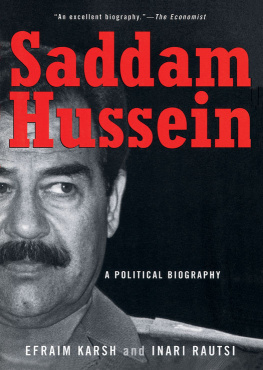
An imprint of Penguin Random House LLC
375 Hudson Street
New York, New York 10014

Copyright 2016 by John Nixon
Penguin supports copyright. Copyright fuels creativity, encourages diverse voices, promotes free speech, and creates a vibrant culture. Thank you for buying an authorized edition of this book and for complying with copyright laws by not reproducing, scanning, or distributing any part of it in any form without permission. You are supporting writers and allowing Penguin to continue to publish books for every reader.
Blue Rider Press is a registered trademark and its colophon is a trademark of Penguin Random House LLC
Library of Congress Cataloging-in-Publication Data
Names: Nixon, John, author.
Title: Debriefing the president : the interrogation of Saddam Hussein / John Nixon.
Description: New York : Blue Rider Press, 2016. | Includes bibliographical references and index.
Identifiers: LCCN 2016047934 (print) | LCCN 2016048643 (ebook) | ISBN 9780399575815 (hardcover : alk. paper) | ISBN 9780399575822 (epub)
Subjects: LCSH: Hussein, Saddam, 19372006Imprisonment. | Hussein, Saddam, 19372006Last years. | Nixon, John (Middle East expert) | IraqPolitics and government2003
Classification: LCC DS79.66.H87 N59 2016 (print) | LCC DS79.66.H87 (ebook) | DC 956.7044/3dc23
LC record available at https://lccn.loc.gov/2016047934
p. cm.
Penguin is committed to publishing works of quality and integrity.In that spirit, we are proud to offer this book to our readers; however, the story, the experiences, and the words are the authors alone.
This does not constitute an official release of CIA information. All statements of fact, opinion, or analysis expressed are those of the author and do not reflect the official positions or views of the Central Intelligence Agency (CIA) or any other U.S. Government agency. Nothing in the contents should be construed as asserting or implying U.S. Government authentication of information or CIA endorsement of the authors views. This material has been reviewed solely for classification.
Version_1
For my mother, Helen, and my father, Richard
More is thy due than more than all can pay.
Macbeth, act 1, scene 4
Contents
---------
As required of all current and former employees of the Central Intelligence Agency, I submitted the manuscript of this book to the CIAs Publication Review Board. The PRB is charged with ensuring that neither confidential nor classified information is inadvertently revealed. Debriefing the President twice underwent extensive PRB reviews. The result is twofold: the manuscripts publication, unfortunately, was significantly delayed, and, throughout this book, you will find black bars used to indicate where the CIAs redactions were applied. I apologize in advance for any inconvenience, and regret that the CIA has censored some material that in no way compromises official secrets.
John Nixon
Prologue
Unfinished Business
---------
But the participant has at least one vital contribution to make to the writing of history: He will know which one of the myriad of possible considerations in fact influenced the decisions in which he was involved; he will be aware of which documents reflect the reality as he perceived it; he will be able to recall what views were taken seriously, which were rejected, and the reasoning behind the choices made... If done with detachment, a participants memoir may help future historians judge how things really appeared, even (and perhaps especially) when in the fullness of time more evidence becomes available about all dimensions of the events.
Henry Kissinger, White House Years, 1979
T he rise of Islamic extremism in Iraq, chiefly under the rubric of ISIS (or Islamic State in Iraq and al-Sham), is a catastrophe that the United States neednt have faced had it been willing to live with an aging and disengaged Saddam Hussein. I do not wish to imply that Saddam was innocent of the charges that were thrown at him over the years. He was a ruthless dictator who, at times, made decisions that plunged his region into chaos and bloodshed. However, in hindsight, the thought of having Saddam Hussein in power seems almost comforting in comparison with the awful events and wasted effort of Americas brave young men and women in uniform, not to mention the $3 trillion and still counting we have spent to build a new Iraq.
In December 2003 and January 2004, I was the first American to conduct a prolonged interrogation of Saddam Hussein after his capture by U.S. forces. I was a senior CIA leadership analyst who had spent the previous five years studying Iraq and Iran. At the start of the debriefings, I felt I knew Saddam. But in the ensuing weeks, I learned that the United States had vastly misunderstood both him and his role as a determined foe of radical currents in the Islamic world, including Sunni extremism.
Ironically, while American neocons tried their best to link Saddam to 9/11 and al-Qaeda, Saddam thought that the attacks on the World Trade Center and the Pentagon would move the United States closer to his Baathist regime. In Saddams mind, the two countries were natural allies in the fight against extremism and, as he said many times during his interrogation, he couldnt understand why the United States did not see eye to eye with him. Saddam was a Sunni himself, his Baath Party stood for Arab nationalism and socialism, and he saw Sunni extremism as a threat to his power base. Saddam portrayed himself as utterly fearless, but to my surprise, he told me he feared the rise of extremism in his country. He knew how difficult it would be to use his mostly Sunni apparatus of repression to fight an enemy whose galvanizing principle was Sunni fundamentalism.
The Israeli scholar Amatzia Baram has observed that Saddam was always aware of the danger of a competing elite, regardless of its religious or secular sympathies. Saddam believed that there could be only one leader and said, You must understand: Iraqis are always plotting against youespecially the Shia! If you look at Iraqi history since the fall of its monarchy in 1958, you would have to concede that Saddam had a point. Iraqi politics has been beset by rival factions that have often been at each others throats. Saddam was often mischaracterized as a nonbeliever or as someone who used religion clumsily to promote his own political goals. Actually, he was not hostile to religion per se; he just demanded that he be allowed to control whatever religious activity there was in Iraq. Saddam was a believer, butand this is a crucial distinctionon his own terms. In 1991, after the Gulf War, he brought religion and religious symbols more and more into Iraqs public life.
But Saddams religious tolerance had clear limits. As he said to me during his debriefing, I told them that if they wanted to practice their religion, that would be acceptable to me. But they cannot bring the turban into politics. That I will not permit. Saddam was talking about Shiites, although his injunction applied to Sunni fundamentalists too. In this case, he was referring specifically to Shia religious leaders such as Muhammad Baqr al-Sadr and Muhammad Sadiq al-Sadr, who had chosen to oppose Saddam and threatened his regime with a potential Islamic revolution similar to the one that had overthrown the shah in Iran in 1979. He had both of them killed.

